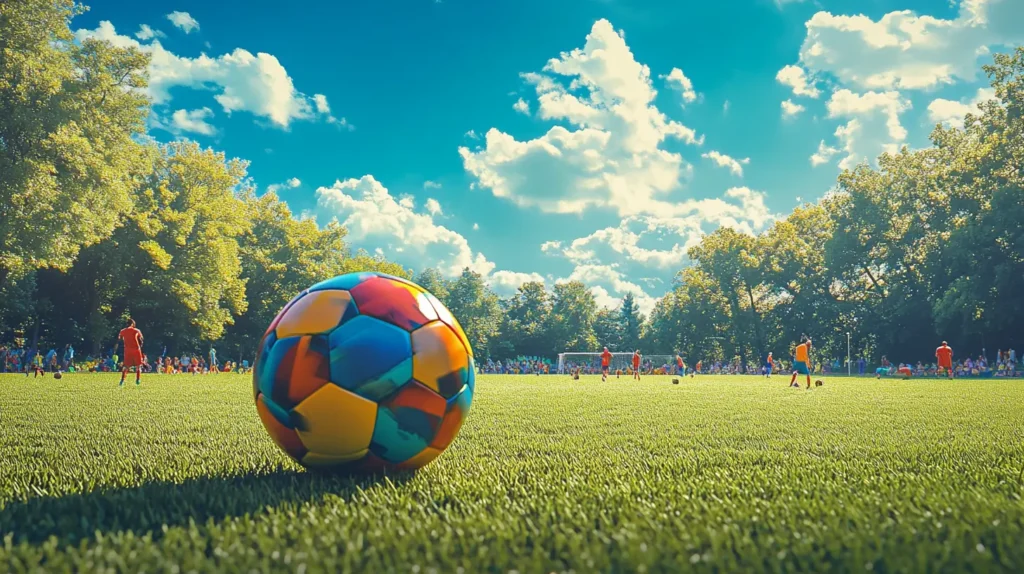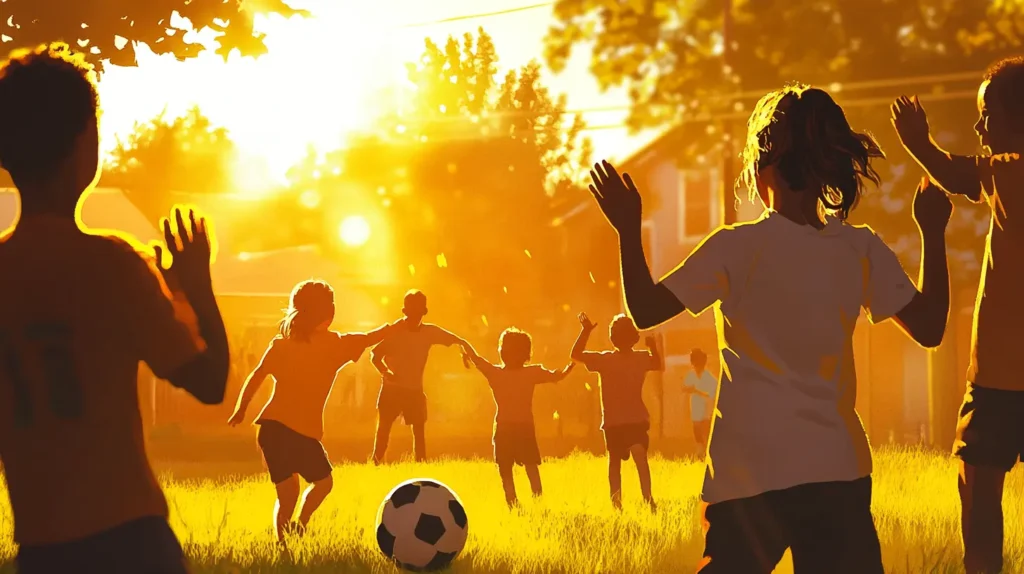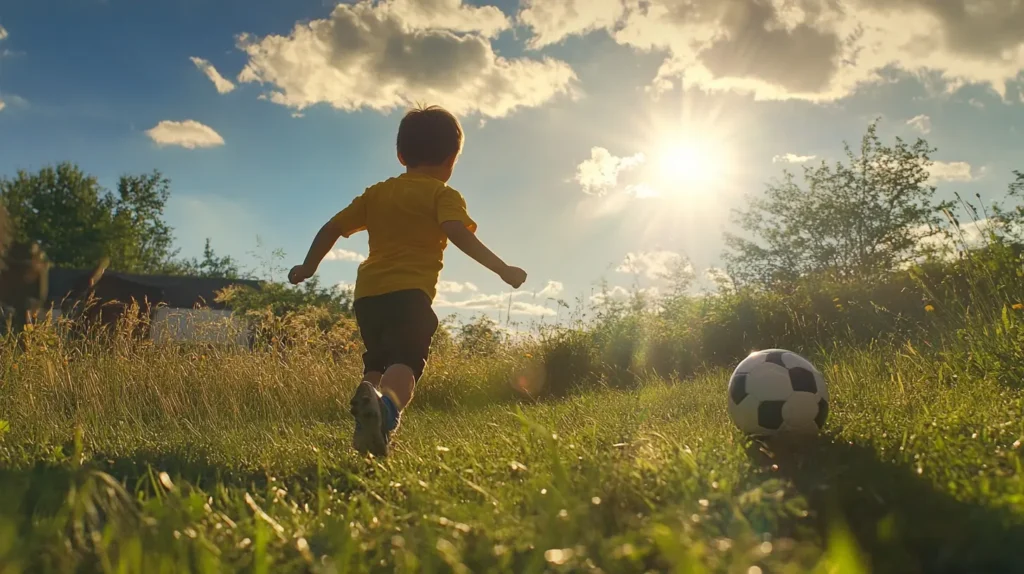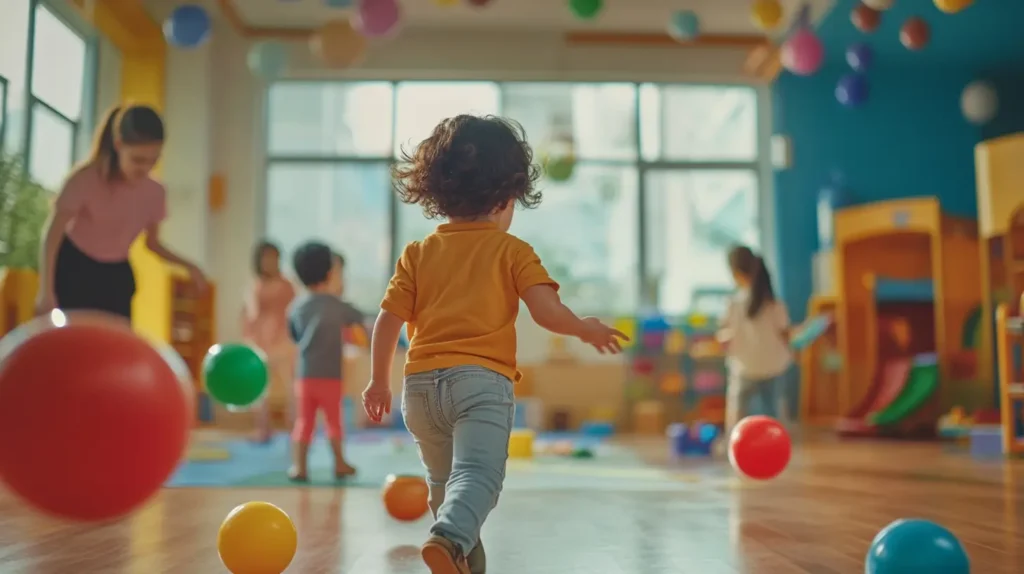Introduction
The experience of playing soccer in sensory details is a journey filled with excitement and growth, especially for children. From the moment they step onto the field, kids are immersed in a world of vibrant sights, energizing sounds, and engaging textures that make soccer more than just a game—it’s an adventure that nurtures their development.
Every aspect of playing soccer in sensory details contributes to their growth. They feel the soft grass beneath their cleats, hear the lively cheers of teammates and parents, and see the dynamic action unfold on the field. These sensory experiences provide physical, mental, and social benefits, helping children grow into confident and well-rounded individuals.
This article explores the unique benefits of playing soccer in sensory details, focusing on how this beloved sport helps children develop skills that extend far beyond the field.
Table of Contents
The Physical Benefits for Kids Playing Soccer

Building Strength, Coordination, and Endurance
The physical benefits of playing soccer in sensory details are immense for children. The sport demands constant movement, such as running, jumping, and kicking, which strengthens their muscles and improves cardiovascular health. Soccer engages the entire body, making it a perfect activity for building endurance and agility in young players.
When children experience playing soccer in sensory details, their coordination also improves significantly. Dribbling the ball while navigating the field hones their balance and fine motor skills. Quick direction changes, sprints, and stopping movements contribute to better control over their bodies.
According to studies, soccer supports healthy growth by providing exercise intensities ideal for endurance training, making it particularly effective for children in their formative years. These physical activities ensure that playing soccer in sensory details is not just fun but also a foundation for lifelong fitness.
Improving Fine and Gross Motor Skills
One of the standout benefits of soccer is its ability to enhance both fine and gross motor skills in children. Fine motor skills are developed through activities like precise dribbling, aiming passes, and shooting, which require focus and control. These skills translate into better hand-eye and foot-eye coordination, which are useful in everyday activities.
Gross motor skills, on the other hand, involve large muscle groups. The running, jumping, and diving that soccer demands strengthen these muscles and improve overall physical competence. A study in the European Journal of Sport Science found that children who regularly play soccer exhibit better motor skill performance than their non-athletic peers.
By engaging in soccer, kids not only enjoy a fun and exciting game but also build a strong foundation for their physical health and capabilities.
The Mental and Emotional Growth Through Soccer

Boosting Confidence and Resilience
The mental benefits of playing soccer in sensory details are just as impactful as the physical ones. Every game or practice session offers children moments to achieve small victories, whether it’s scoring a goal, successfully defending, or learning a new skill. These accomplishments build self-confidence, teaching kids to believe in their abilities.
Resilience is another key benefit of playing soccer in sensory details. Children face challenges like losing a match, missing a penalty, or adapting to new teammates. These experiences help them develop a growth mindset, showing them the value of persistence and learning from setbacks. A study published in the Journal of Adolescent Health found that participation in team sports, including soccer, is associated with higher self-esteem and better emotional regulation in children. This resilience helps them handle not only sports challenges but also academic and social pressures.
Enhancing Focus, Problem-Solving, and Decision-Making
When kids are playing soccer in sensory details, they sharpen their ability to think on their feet. The fast-paced nature of soccer demands focus and quick decision-making. Players must evaluate situations, predict opponents’ actions, and choose the best moves, all in a matter of seconds.
Research published in Frontiers in Psychology highlights that team sports like soccer improve executive functions in children, including working memory, attention, and decision-making. These skills are not only valuable on the field but also in the classroom, as they contribute to better academic performance.
By engaging in soccer, children learn to think strategically and stay mentally sharp, qualities that benefit them in many aspects of life.
The Social and Teamwork Advantages of Soccer

Learning Communication and Collaboration Skills
One of the most significant benefits of playing soccer in sensory details is its ability to teach children how to communicate and work effectively in a team. Soccer is a sport that thrives on collaboration, requiring players to coordinate passes, strategize movements, and support one another during games. These interactions help kids develop essential communication skills and learn the value of teamwork.
Research published in the Journal of Sports Science & Medicine highlights that team sports like soccer promote prosocial behaviors, including cooperation, empathy, and communication. This makes soccer a powerful tool for helping children learn how to interact positively with others.
Developing Empathy, Leadership, and Friendship
Soccer fosters a sense of camaraderie and empathy among teammates. By working together, kids learn to understand each other’s perspectives and support one another through victories and challenges. This shared experience builds strong, lasting friendships that often extend beyond the field.
Leadership opportunities also arise in soccer. Whether acting as team captain or simply taking initiative during key moments, children develop responsibility and decision-making skills. A study in Sports Coaching Review found that participation in team sports enhances young athletes’ leadership traits, including adaptability and motivational skills.
Through playing soccer in sensory details, children not only enjoy the thrill of the game but also grow socially and emotionally, forming friendships and leadership qualities that last a lifetime.
The Sensory Joy of Playing Soccer

Feeling the Grass, Ball, and Movement
When children are playing soccer in sensory details, they experience a world of textures and motion. The soft grass beneath their cleats provides a connection to the field, whether it’s freshly cut in the morning or slightly damp after rain. The ball itself, with its smooth surface and responsive bounce, becomes an extension of their body as they dribble, pass, and shoot.
Sliding tackles and quick sprints across the field add to the sensory experience, making kids feel alive and engaged. Research published in the European Physical Education Review suggests that physical sensations during sports, like soccer, improve body awareness and spatial orientation, essential skills for growing children.
Hearing Cheers, Encouragement, and the Sounds of the Game
The sounds of soccer are just as magical. Children hear the rhythm of cleats on the grass, the satisfying thud of the ball, and the sharp whistle of the referee. These auditory elements help kids stay focused and in tune with the game.
Equally important are the cheers from the sidelines. Supportive voices from teammates, parents, and coaches create a positive environment that boosts morale and motivation. According to a study published in the Journal of Applied Sport Psychology, positive auditory feedback during sports increases children’s enjoyment and commitment to the activity.
Seeing Vibrant Colors and Dynamic Action
The visual elements of playing soccer in sensory details captivate children and improve their focus. The bright green of the field, the contrasting colors of team jerseys, and the fast-paced movement of the ball create a stimulating environment. These visuals help children develop visual tracking skills and concentration, which are useful in many areas of life.
A report in the International Journal of Sports Vision found that sports like soccer enhance visual-motor coordination in children, further supporting their physical and cognitive development.
FAQs
How does playing soccer benefit children physically?
Playing soccer improves kids’ strength, coordination, and endurance. The sport involves running, kicking, and quick direction changes, which enhance cardiovascular health, build muscle, and improve agility. It also refines both fine and gross motor skills, making it an excellent physical activity for growing bodies.
Can soccer improve children’s mental well-being?
Yes! Soccer boosts confidence and helps kids develop resilience by teaching them how to overcome challenges, like losing a game or missing a goal. It also enhances focus, problem-solving skills, and decision-making abilities, contributing to better emotional regulation and mental sharpness.
What social benefits does soccer offer for children?
Soccer fosters teamwork, communication, and empathy. By working closely with teammates, kids learn to collaborate, express themselves, and support others. The friendships and camaraderie built through soccer often last a lifetime and extend beyond the game.
How does soccer engage children’s senses?
Soccer is a sensory-rich experience. Kids feel the ball and grass, hear the cheers and sounds of the game, and see the vibrant action on the field. These sensory details not only make the game enjoyable but also help develop coordination, focus, and body awareness.
At what age should children start playing soccer?
Children can start playing soccer as young as three or four years old in introductory programs. These focus on fun and basic skills. Organized team play usually begins around age six or seven, depending on the league.
How can parents encourage their children to enjoy soccer?
Parents can support their kids by attending games, cheering them on, and providing positive reinforcement. Encouraging practice in a fun, pressure-free environment also helps. Exposing kids to professional matches can inspire them and show the exciting possibilities of the game.
Conclusion
Soccer isn’t just a game for children; it’s a life-enriching experience that engages their minds, bodies, and emotions. The sights, sounds, and sensations of playing soccer create a unique environment where kids can grow, learn, and thrive.
From building physical strength and coordination to fostering resilience, confidence, and teamwork, soccer equips children with valuable skills they’ll carry throughout their lives. It’s a sport that helps them make friends, solve problems, and discover the joy of being part of something bigger than themselves.
By immersing kids in the sensory magic of soccer, we give them more than an activity—we give them memories, lessons, and the tools to navigate the world with enthusiasm and confidence. Soccer is more than a game; it’s a journey of discovery, growth, and joy that every child deserves to experience.
For more content :

